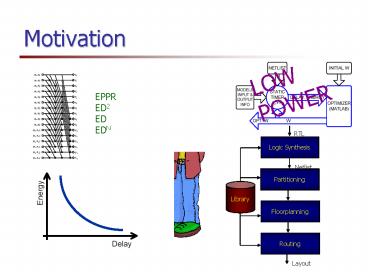Motivation
1 / 12
Title: Motivation
1
Motivation
LOW POWER
EPPR ED2 ED EDN
2
Problem Statement
- Incorporate E-D sensitivity analysis using an
appropriate metric into logic synthesis to
produce designs optimized in the energy-delay
space. Success of implementation is measured by
two parameters - Rate of convergence (RoC) of results
- Implementation must produce results fast
- Quality of result (QoR)
- Results should be equivalent to custom-design
3
Prior Work
GUIDING PRINCIPLE At all levels of design,
balance energy-to-delay sensitivity of each
tuning variable similarly.
- R.W. Brodersen, M.A. Horowitz, D. Markovic, B.
Nikolic, V. Stojanovic. Methods for true power
minimization. IEEE/ACM International Conference
on Computer Aided Design. IEEE/ACM Digest of
Technical Papers. IEEE. 2002, pp.35-42.
Piscataway, NJ, USA. - R. Zlatanovici, B. Nikolic. Power - Performance
Optimal 64-bit Carry-Lookahead Adders, European
Solid State Circuits Conference (ESSCIRC) 16-18
September 2003, Estoril, Portugal, pp. 321-324
4
Investigative Approach
- Build and test synthesis-based front-end and
back-end design flow - BWRC BEE front-end and ST Avanti-based back-end
- Evaluate E-D sensitivity metrics for accuracy and
simplicity - Metrics Cgate/Cwire, EPPR, ED
- Benchmarks with known logic and wire structure
- Evaluate relative impact of wiring on power
density for hierarchical designs vis-à-vis sizing - Create models and simplified sensitivity analysis
tool appropriate for synthesis embed into design
flow - Test on real-world benchmarks
- Evaluate results based on RoC and QoR
5
Conventional Methodology
RTL
No accurate models for energy-delay tradeoffs. Ad
-hoc decisions to meet power budget
Logic Synthesis
Netlist
Power- Performance OK?
No
Library
No
Yes
Power- Performance OK?
Place Route
Layout
Yes
6
BWRC Front-End Flow
Matlab/Simulink
Test Vectors
Xilinx System Generator
High Level Models
Environment Setup
Behavioral VHDL
Design Flow Management
P R Constraint Files
Synopsys PrimeTime
Synopsys Design Compiler
DC Scripts
Gate-level VHDL
P R Constraints
7
Hand-Off To Back-End
ST Unicad Setup
Handoff Avanti Setup
Files Placed In Directories
Environment Setup
Handoff Scripts
HO Generate Tasks
Clock Tree Defn. Scripts
CT Generate Tasks
Clock Constraints
CT Edit
Power Supply Specification
Power .attx file
Netlist Checks
8
Avanti Back-End Flow Summary
9
Proposed Design Flow Changes
The key is in selecting an accurate but
simpleE-D sensitivity metric
RTL
Model is topology-dependent
Logic Synthesis
Power-Performance Optimization Using E-D
Sensitivity Analysis
Data must be in a uniform format to allow tight
integration fast computation
Library
Place Route
Model is interconnect and gate-size dependent
Layout
10
Preliminary Results
11
Preliminary Results
12
Future Work
- Complete evaluation of impact of wiring on power
density and delay for IEU - Relate to EPPR and choice of Cin
- Evaluate EPPR vs. Cwire/Cgate ratio for ALU and
IEU - Refine models for energy, delay, sensitivity
- Incorporate into synthesis tool
- Evaluate on real-world example
- Measure RoC and QoR































